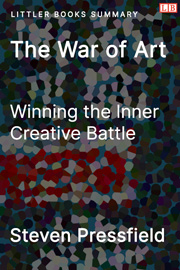Book Description
A practical guide to defeating the forces of resistance that hold back artists, entrepreneurs, and other creative people.
If You Just Remember One Thing
Coming soon.
Bullet Point Summary and Quotes
- Resistance is a destructive inner force that opposes any project or ambition we undertake. It manifests as procrastination, self-doubt, fear, and other guises which hold us back from achieving our goals.
- “It's a repelling force. It's negative. Its aim is to shove us away, distract us, prevent us from doing our work.”
- “I can always start eating healthy tomorrow instead of today,” or “My dream project is too risky so I'll continue working at my job” are examples of resistance at work.
- Resistance affects everyone, from aspiring artists to seasoned professionals.
- Resistance thrives on stagnation and defends the status quo -- it wants to keep things comfortable and the same.
- Many of us feel like we have a calling -- something that we were meant to do. The forces of resistance (fear, self-doubt, etc.) prevent us from pursuing this calling. However, the presence of these feelings are evidence that we care deeply about something. Rather than avoiding what makes us afraid, we can let it motivate us and guide us toward what matters most.
- “If you find yourself asking yourself (and your friends), ‘Am I really a writer? Am I really an artist?' chances are you are. The counterfeit innovator is wildly self-confident. The real one is scared to death.”
- “Fear is good. Like self-doubt, fear is an indicator. Fear tells us what we have to do. Remember one rule of thumb: the more scared we are of a work or calling, the more sure we can be that we have to do it.”
- Many Hollywood actors pursue roles that they're afraid of because it indicates they're truly passionate about it.
- To defeat resistance and realize our dreams, we must commit fully by adopting the mindset of a professional. This means approaching our calling with the same dedication required of a full-time job. It means showing up daily and working steadily, not just when we feel like it.
- “The most important thing about art is to work. Nothing else matters except sitting down every day and trying.”
- “I write only when inspiration strikes. Fortunately it strikes every morning at nine o'clock sharp.” - William Somerset Maugham, writer
- “This is the other secret that real artists know and wannabe writers don't. When we sit down each day and do our work, power concentrates around us. The Muse takes note of our dedication. She approves. We have earned favor in her sight. When we sit down and work, we become like a magnetized rod that attracts iron filings. Ideas come. Insights accrete.”
- There are always skills you can transfer from your old job to your new passion -- organization skills, self-discipline, punctuality, etc.
- As a professional, we must have an intimate understanding of our own abilities and limitations. We must know when to ask for help and guidance. We must always be learning.
- Even world-class athletes like LeBron James and Tiger Woods, considered the best in their sports, still have trainers and coaches.
- Professionals focus on the process instead of rushing to reach the goal. Realizing a dream requires organization, patience, and the courage to confront adversity and obstacles as opportunities to grow.
- Despite skepticism that a black woman could succeed in the talk show field dominated by white men, Oprah Winfrey remained committed to her vision of highlighting guests' personal lives, resulting in one of the most successful talk shows ever conceived. She used criticism as motivation to work even harder as a true professional would.
- When we commit deeply, we can combat resistance by reaching into our “madness”, described by Plato as becoming wholly absorbed in the creative flow.
- We all operate within the confines of hierarchies, where we're designated roles and work to please others in order to climb the hierarchy. Hierarchies resist change and stifle creativity.
- Professionals break free from hierarchies. Professionals work for themselves, not an audience or social rank.
- “For the creative artists must be a world for himself, and find everything within himself…” - Rainer Maria Rilke, writer
- “We must do our work for its own sake, not for fortune or attention or applause.”
- Every professional has a territory -- the domain where they devote themselves to their craft. Arnold Schwarzenegger's territory was the gym, Alfred Hitchcock's is filmmaking.
- Your territory should give you “sustenance”, a feeling of satisfaction and betterment.
- Your territory should be where you spend most of your time and give the most effort.
- Your territory should offer unlimited potential, as the more effort you invest the more opportunities you should receive.
- “Creative work is not a selfish act or a bid for attention on the part of the actor. It's a gift to the world and every being in it. Don't cheat us of your contribution. Give us what you've got.”
The War of Art: Resources
- Download this summary and 173+ other top nonfiction book summaries in one book (PDF, eBook, DOCX)
- Buy the book
